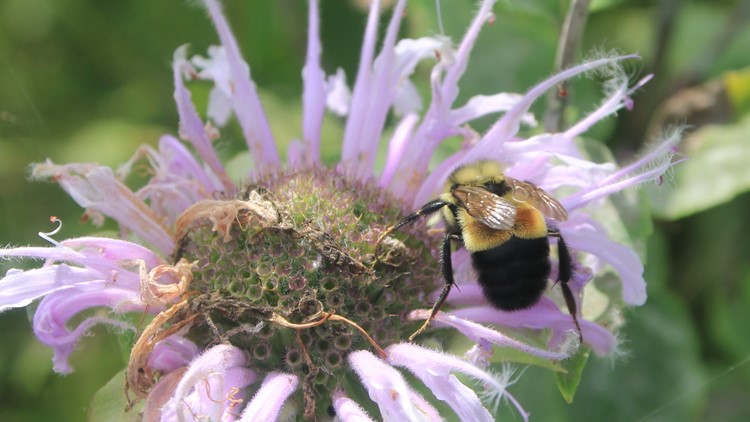MOLINE, Ill. — The Quad Cities will be full of excitement this weekend between the Bix7 and the end of RAGBRAI. If partying with 10,000 people isn't your cup of tea, U.S. Fish & Wildlife Service could use your help with taking pictures of bugs.
The second annual "Backyard Bee Blitz," lasting from July 28-30, asks nature lovers in the Quad Cities to track what kinds of bees and other insects are visiting local flowers. Anyone in Scott, Rock Island, Henry, Mercer or Muscatine Counties can participate in the campaign.
The Bee Blitz is based on BioBlitz, an iNaturalist activity where all the biodiversity in a specific area is examined to provide a snapshot in time of local flora and fauna.
Of special interest this year is the rusty patched bumble bee, an elusive and federally endangered pollinator native to the area. Its range once stretched from the eastern U.S. to the upper Midwest and into Canada, but due to introduced disease and pesticides, it has experienced a steep population decline.
Scott James, a partners and private lands biologist for U.S. Fish & Wildlife, said the Bee Blitz brings the community together in photographing and compiling observations of pollinators.
"Anyone with a smart phone can join the fun!" James wrote in an email. "If we're lucky, people will see and photograph the federally endangered rusty patched bumble bee, which allows scientists to have a more thorough understanding of its presence here."
Here's how you can join in:
- Download the iNaturalist app and make a free account.
- Go to the "Projects" tab on the bottom right and search for the "2023 Bi-CAN Backyard Bee Blitz," and hit join.
- Go outside anytime from July 28-30 and take photos of any creature seen visiting a flower.
- Upload your photos to iNaturalist. You don't need to upload them immediately, just be sure to select the correct date when uploading. They'll automatically be counted as part of the Backyard Bee Blitz.
The campaign is organized by the U.S. Fish & Wildlife Service, Rock Island County Soil and Water Conservation District, Nahant Marsh Education Center and the Bi-State Conservation Action Network.



